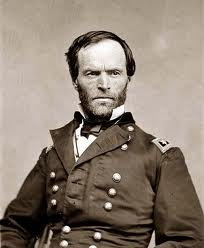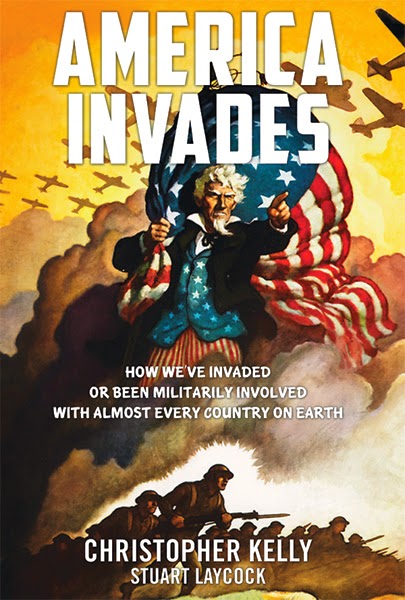 |
| The Laws of War |
The United States of America has a long and complicated relationship with warfare. Some historians have, for example, interpreted American history as a being primarily a series of wars and invasions. European settlers fought a long series of wars against the native American peoples (from King Philip's war in Massachusetts to Little Big Horn in Montana) as a burgeoning land-hungry American population spread westwards to the Pacific. The French and later British attempted to manipulate the native Americans in order to thwart the expansion of the American colonies and later nation. Jefferson, a product of the Enlightenment, wrote that "the known rule of warfare with the Indian savages is an indiscriminate butchery of men women and children."
Cynics suggest, with some credibility, that America was won by a combination of warfare and shrewd deal-making. American Patriots or Rebels, depending on one's perspective, fought a war against their mother country, England, to win the independence of the 13 colonies. After the Revolution, Washington and Federalists tried to steer a course of neutrality. Yet President Madison led America into a nearly disastrous war for the rights of neutrals in the war of 1812 (see earlier posts War of 1812 4/1/12 and James Madison's USA and Hideki Tojo's Japan, 7/9/12). The Louisiana territory was purchased by Jefferson from Napoleon in 1803 for $15 million dollars (see earlier post Napoleon...Relevant to Americans in 2012?, 5/28/12). The deed was ratified in blood with the War of 1812. The Mexican-American war, led by President Polk, won the territory that would later become the states of California, Arizona, New Mexico and Texas. Alaska was purchased from Tsarist Russia. The Northwest territory (Washington, Oregon, etc.) was negotiated with Britain. The Hawaiian or Sandwich islands were conquered first by American missionaries and then by American arms. Puerto Rico and Guantanamo were prizes of the Spanish-American war of 1898.
While America was fashioned by force of arms, the nation has had a strong countervailing peace-loving tradition as well. Many European immigrants fled their native lands to escape the incessant wars that have plagued the European continent. Many groups, such as the Quakers, were adamantly opposed to war in any form on religious grounds.
 |
| Benjamin Franklin (1706 -1790): "Make Love not War!" |
In spite of these "make love not war" sentiments, Franklin was an ardent Patriot whose support for the American cause estranged him from his own son who became the Tory Governor of New Jersey. Franklin's assistance in negotiating of a treaty with France was a decisive component of American victory in the Revolution.
 |
| Charles Sumner (1811 - 1873): The Pacifist who got Mugged |
By 1861, however, Charles Sumner, an ardent abolitionist, would be vigorously defending the Union's war against slavery and the Confederacy. Witt neglects to mention what caused this radical change in Sumner's attitude towards war; in 1856 Republican Senator Sumner, after having made a strident abolitionist speech in Congress, was savagely attacked with a cane and nearly killed by Democratic Representative Preston Brooks of South Carolina. Sumner was, perhaps, the prototype of the liberal who got mugged by reality to become a Conservative.
 |
| Francis Lieber (1798 - 1872): Author of Lincoln's Code |
Witt writes, "What Lieber loved to talk about most was war. As a student in 1821, he had studied military mathematics and geometry of the kind taught at the US military Academy at West Point...As Lieber saw it, modern warfare had undergone a dramatic transformation. The age of gunpowder had transformed was into a mass phenomenon The 'individual,' he wrote, was 'lost more and more in the mass. But even in an age of mass violence -- especially in an age of mass violence...Lieber believed that war had a deep and profound moral significance. In his two-volume Manual of Political Ethics, published in 1838 and 1839, Lieber contended that pacifism was a view held 'by persons who have an inadequate idea of what war actually is.' Lieber knew war, and in his view war was not only morally permissible, it was morally imperative. War's moral virtues were the qualities of 'energy and independence of thought, elevation and firmness of character, intensity of action.' War brought out in men a 'peculiar attribute of greatness of intellect.' It communicated 'the spark of moral electricity.'" (www.amzn.com/1416569839)
Lieber's intellectual convictions would be put to the test in the fiery cauldron of the US Civil war. Lieber and his wife had three sons -- Oscar, Hamilton and Norman. Oscar Lieber fought for the Confederacy and was killed in action at the battle of Williamsburg. Hamilton Lieber became an officer who fought for the Union and was wounded at the battle of Fort Donnelson. Their youngest son Norman would continue his father's work serving as a Judge Advocate General in the US Army after the war.
President Lincoln required codification of the proper laws of war in this age of mass violence. He turned to Lieber. Francis Lieber wrote the General Orders 100 ("Old Hundred") that was issued by the War department in Arpil, 1863 and served as the US Army's code of conduct for over 40 years. It was Lieber's firm conviction that "the shorter war is, the better; and the more intensely it is carried on, the shorter it will be." Lieber, the old Prussian, agreed with Clausewitz that war was "politics by other means" and that certain political circumstances (e.g. preservation of the Union and elimination of slavery) created the conditions for a 'just' war. Lieber believed that even wars of necessity had limits to which the armed forces of both sides should subscribe. The Old Hundred maintained, for example, that "military necessity does not admit of...torture to extort confession."
Lincoln's Code, as written by Lieber, had practical consequences for the US Civil War. The Old Hundred laid the groundwork for the enlistment of over 200,000 freed slaves into the Union Army following Lincoln's Emancipation proclamation. Lieber's work also codified treatment of prisoners, prisoner exchanges, treatment of irregular partisan forces, etc.
 |
| William Tecumseh Sherman, 1820 - 1891 |
The unsentimental Sherman proclaimed, "I would not coax them, or even meet them half-way, but make them so sick of war that generations would pass away before they would again appeal to it." In this grim task, Sherman was successful. The constitutional question of a state's right to secede from the Union was adjudicated, once and for all, in the trial of Grant versus Lee at the courtroom of Appomattox.
Witt writes, "Lieber summed up the moral theory of the code in one of its first articles: 'Men who take up arms against one another in public war, do not cease on this account to be moral beings, responsible to one another and to God.'" Lieber's work later became a model for the drafters of the Geneva Convention.
The difficult and ambivalent questions of war and morality that Americans struggled with at our founding and through the 19th century are not really so very different from the questions of procedure raised by armed conflict today. Are extreme interrogation methods ever justified or not? How much collateral damage is acceptable?
Commander Kelly concludes, "If you have a serious interest in war and the proper conduct of war, Lincoln's Code by John Fabian Witt should be on your reading list!"
Special thanks to Nina Van Rensselaer for sending me a copy of this book!
* Little wonder that the most popular American tank of World War II was named after William Tecumseh Sherman.
You can now purchase Commander Kelly's

3 comments:
Thanks, glad you liked it! Gratifying to have good readers. Even better to have good readers who find things to like in the book.
All best,
John
My one quarrel with the book is hinted at in the conclusion of my review of Spielberg's Lincoln movie (earlier post). I think that Lincoln could and should have won the war in 5 months instead of 4 years. Dismissing incompetent leaders like McClellan and pursuing Sherman's tactics (with Lieber's blessing) might have dramatically shortened the war and reduced the total body count (Lee staying loyal to the Union would have done the same). Hypothetical, of course, but interesting. Lincoln's painful learning curve with regard to military matters was extremely costly.
As to your quarrel, I'm no expert on this feature of the military history of the war, but it sure seems like the entire Union military had the same learning curve. Sherman wasn't Sherman in 1861! Neither the political landscape nor the military was ready in 1861 for what happened from 1863 to 1865. That's my hunch, anyway!
Post a Comment